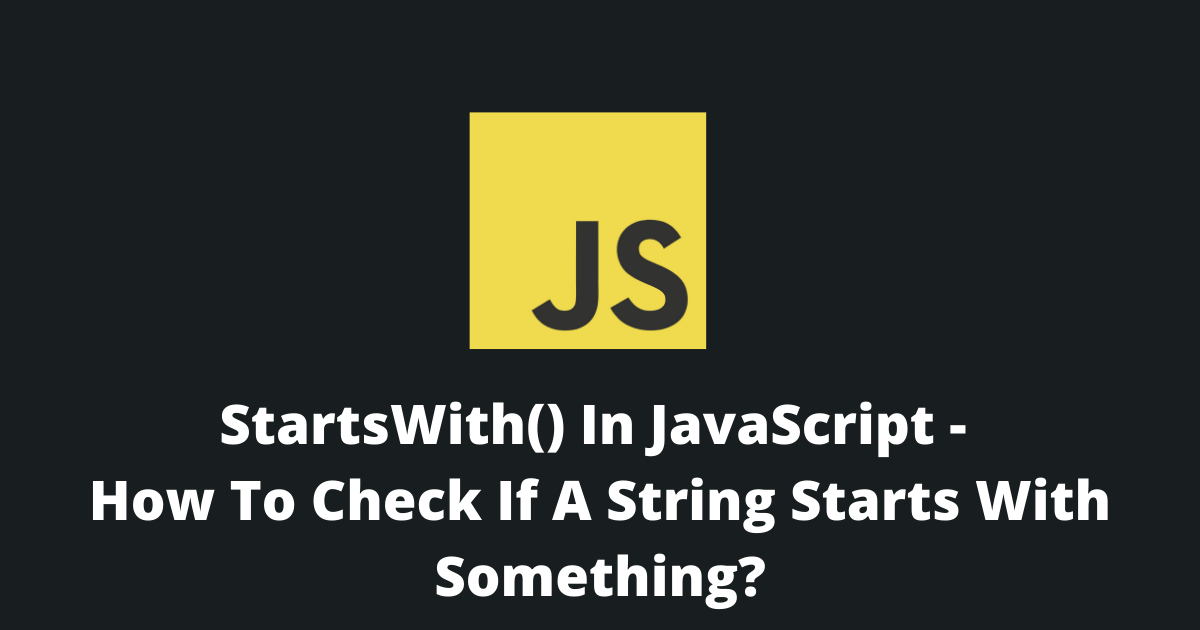StartsWith() In JavaScript - How to check if a string starts with X?
In JavaScript, the easiest way to check if a string starts with something is to use the startsWith() function.
This article will tell you everything that you need to know about this function.
By the end of this guide, you will become a pro of this function and you will know:
- How to use it?
- When to use it?
- And, will be able to explain it to others.

Definition
The startsWith() function is used to determine if a string begins by a search value.
If the string begins by the search value, it returns true, otherwise, it returns false.
javascriptconst str = "This is a very long string!";
// This will return true. ✅
console.log(str.startsWith('This'));
// This will also return true. ✅
console.log(str.startsWith('This is a'));
// This will return false. ❌
// startsWith() is case sensitive.
console.log(str.startsWith('this'));
// This will also return false. ❌
console.log(str.startsWith('string'));
This is the startsWith() function syntax:
str.startsWith(searchValue[, startPosition])Here are some things that you need to take into considerations:
- This function is case sensitive.
- You can specify a start position (completely optional).
Parameters
| Parameters | Necessity | Description |
|---|---|---|
| searchValue | Required | The value to search for. |
| startPosition | Optional | The default position is 0, but you can specify your own. |
Return Value
This method will return a boolean.
true => if the string starts with the search value.
false => if the string doesn't start with the search value.
Browser Support
This method only works on browsers that support ES2015.
| Browser | Support |
|---|---|
| Chrome | YES ✅ |
| Firefox | YES ✅ |
| Opera | YES ✅ |
| Safari | YES ✅ |
| Edge | YES ✅ |
| Internet Explorer | No ❌ |
To support legacy browsers like Internet Explorer you will need to add a polyfill.

How to make the startsWith() function case insensitive?
To make the startsWith() function case insensitive you will need to make both the value and the searchValue lowercase.
javascriptconst str = "This is a very long string!".toLowerCase();
const searchValue = "THis".toLowerCase();
// This will return true. ✅
console.log(str.startsWith(searchValue));
Alternatively, you can use the regex method with the "i" modifier.
How to use the startsWith() function with multiple values?
When you need to check if a string starts with either of multiple values, you can check it in two ways.
- The Conditional Way
javascriptconst str = "This is a very long string!";
// This will return true. ✅
console.log(str.startsWith('This') || str.startsWith('String'));
- The Array Way, by using the some() function to iterate thought the array.
javascriptconst str = "This is a very long string!";
// This will return true. ✅
console.log(['This', 'String'].some(word => str.startsWith(word)));
How to fix "startsWith() is not a function"?
There are two main methods to fix this error.
- You need to make sure that you are calling this function on a String. This method will only work on a String, so you will need to cast the value into a String.
javascriptconsole.log(String(unknownValue).startsWith("This"));
- You need to make sure your browser (or nodeJS) supports ES2015. If your environment doesn't support the new EcmaScript you will need to use add this polyfill before calling the startsWith() function.
javascriptif (!String.prototype.startsWith) {
String.prototype.startsWith = function (searchValue, position) {
position = position || 0;
return this.indexOf(searchValue, position) === position;
};
}
Are there alternatives to the startsWith() function?
Of course. There are a lot of alternatives to the startsWith() function.
You can use the indexOf() function, the substring function or a regex.
1. How to check if a string starts with another using indexOf()?
You can get the same behavior as the startsWith() function by using the indexOf() function.
To replicate the startsWith() function, you will need to check if indexOf() return position is 0.
javascriptconst str = "This is a very long string!";
// This will return true. ✅
console.log(str.indexOf("This") === 0);
// This will also return true. ✅
console.log(str.startsWith('This'));
2. How to check if a string starts with another using substring()?
You can check if a string starts with your search value by using the function substring with the length of the search value.
This method is a little more complicated.
javascriptconst str = "This is a very long string!";
// This will return true. ✅
console.log(str.substring(0, 4) === 'This');
// This will also return true. ✅
console.log(str.startsWith('This'));
3. How to check if a string starts with another using a regex?
You can check if a string starts with your search value by using a regex.
This is pretty simple to do and you can specify the case sensitivity. To make the search case insensitive add the "i" modifier at the end of the regex.
javascriptconst str = "This is a very long string!";
// This will return true. ✅
const regex = /this/i;
console.log(regex.test(str));
// This will also return true. ✅
console.log(str.startsWith('This'));
Conclusion
Now that you are a pro of the startsWith() function in JavaScript, please share this article with others so they too can become a pro just like you.

Thanks for reading.

